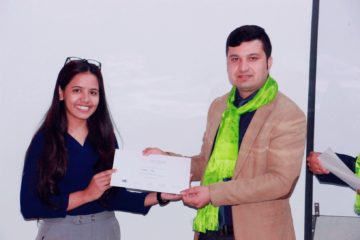Science, Technology, and Engineering are considered to be a multidisciplinary field employing its principles for problem-solving, design, decision making, etc. And it is not only a boy’s game, it’s not only a girl’s game. It’s everyone’s game as the whole is greater than the sum of its individual parts according to the Synergy concept as well. But there is no doubt that Gender stereotypes built upon society consider some professions traditionally suitable for women and some for men. Engineering is one of these professions which is traditionally conceptualized as masculine. And if in the case provided the participation, ambivalence apparently surrounds ‘women engineer ‘even today. These all show still a socio-cultural contradiction between being a woman and being an engineer, mirrored in everyday language, where girls are being regarded as ‘soft and feeble’ and technology to be ‘hard and advanced’.
Contextualizing some anecdotes from my own journey of On Job Training at the end of completion of a Bachelor’s Degree, three of us including me and two other boys were given homonymous responsibility designated from the college. And I was courageous enough to work as per the field of engineering I chose with my own interest in the first hand where many people questioned me for my decision being naïve and the worst one. Well entering the premises into the factory, being a Girl, and to be an Industrial (equivalent to Mechanical) Engineer, it struck me hard as I found some different scenarios. Some kind of prior assumption like girls can never be able to do some work existed everywhere and I felt left out at some point. A feeling of compunction arose inside me of why I chose that very place, still, I had no options left other than accepting and working for it.
Firstly, I was given a gofer delegation, where I should be doing what is ordered and to report when it’s done. From firsthand experience, it was okay but doing the same every day would neither have been productive nor interesting. Still, I worked on continuously and at some point, problems appeared like confusion, and I was puzzled with dis indication to find the causes of those very problems and face them realistically. Only later I was given a steward delegation, where I was given work with trust that focused on results rather than methods and the person performing it. I, then without caring how people would judge me seeing me walking around giant boilers and furnaces for maintenance inspection, worked with my hands black and dirty staining pink pretty clothes, dried up hair and wiped out makeup and rest, I somehow worked on and on. And times later, I felt the narrow perspective and staring eyes of workers and rest turned out to be pleasing and acknowledging. And I must say with that later recognition and acceptance, I, with the view of my supervisor, could come up with a research idea thesis paper on applying autonomous maintenance (self-maintenance credits and permission provided to the worker; either male or female) rather than relying on classical procedures by waiting maintenance personnel to appear, which in short term can save time and increase productivity in long term. Had I been taking futile tensions questioning myself and blaming myself to come
or remain indignant with everyone else and stay there immobile or less mobile just for formal completion of works, I would never have known this much.” I suffered then I learned”.
So what I feel is the real transformation from assumption to acceptance is only possible if firstly girls like us don’t remain collapsed under the crushing burdens of accumulated yesterdays of what society and family told us but to advance for beautiful tomorrow, fearlessly and confidently in the direction of our dreams and endeavors. We have heard about great
audacious women in engineering and technology who have been the inspiration for one and all. Well, were their dreams that big or impossible? No, never, but they with their belief in possibility and hard work than in probability and assumptions fearlessly proved themselves and they stand out as being the example for lots of ladies right here.
We must then and there, now and then, challenge the stereotyping and gender biases that can still pervade the traditional culture, particularly within the male-dominated sectors. So our world, society, family, and importantly we ourselves should create an environment truly fulfilling opportunities for each other. It should be able to nurture more self-awareness and self-worth, to women, for them to gain maturity from dependence to independence and gradually into interdependence aiding one and all.
Lastly, Girls, do we fear to lose? Yes, we may lose and fail, slip up and screw up over and over, yet we should keep ongoing. We must trust ourselves and go on avoiding pleasure; the false god they say. Well, were those all ladies and their dreams were that big or impossible? No, never, but they with their belief in possibility and hard work than in probability and assumptions fearlessly proved themselves and they stand out as being the example for lots of ladies right here. So it will be wise of us to keep on trying as we never know without experimenting. We should not let this remain only in words. Because in reality, there is much to do and we can do, before a girl like us can confidently see our self being a design engineer with a designed prototype, a gas engineer with our own van, an architect with our own design plan, just as easily as we can see ourselves being a housewife, waitress or beautician.
About the Author
Shuveksha Sapkota is a graduated Industrial Engineer and currently working as a Lecturer in Hillside College of Engineering. She is also pursuing MSC in Mechanical System Design and Engineering in IOE, Pulchowk Campus. She makes her actions and behaviors congruent with her values and has an autonoetic consciousness of her self esteem as she works on her circle of influence.
Her lifeline tag is, Becoming me, Becoming more.






